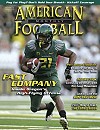Article CategoriesAFM Magazine
|
Your Take: Pay for Play – Don’t Hold Your Breathby: Dean BlevinsSports Director, KWTV © More from this issue It’s really a matter of slave labor vs. political correctness. The workers who bring in hundreds of millions of dollars to schools are the college athletes. The political correctness folks are the establishment – the government, NCAA and the universities. We’re talking the long-debated subject of pay for play. Should the athletes who work year-round to win games, championships, and thus bring big dollars to their institutions deserve some type of compensation? Yes. Will it happen anytime soon? No. Boise State and TCU will have won national two championships each before we see it. I was on football teams at the University of Oklahoma that won Big 8 Conference championships all four years I played and two consecutive national titles. It was only nat....The full article can only be seen by subscribers.
|
|
|||||||
| HOME |
MAGAZINE |
SUBSCRIBE | ONLINE COLUMNISTS | COACHING VIDEOS |
Copyright 2026, AmericanFootballMonthly.com
All Rights Reserved





